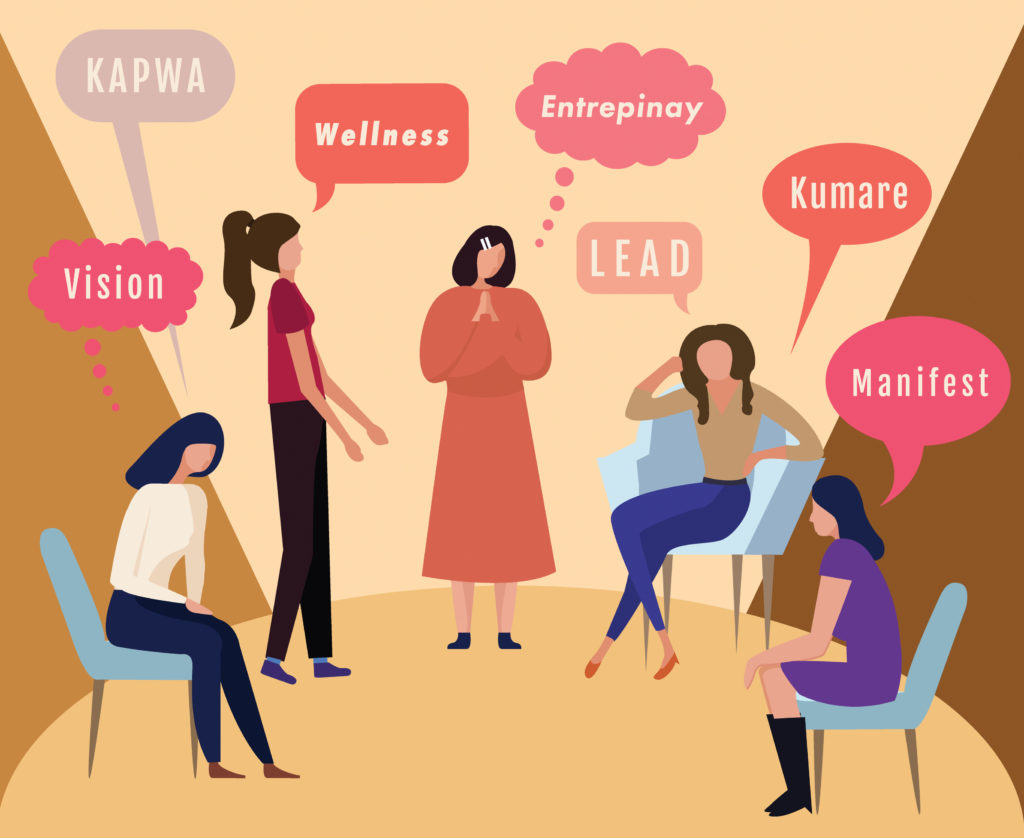
ON a Saturday morning in January, 92 Filipina women congregated at the backyard of a hillside home east of downtown Los Angeles for a half-day business and wellness retreat.
They spread out their yoga mats, where they would spend the next two hours being led through an opening ritual by an albularya (a traditional folk herbalist and spiritual healer), a 40-minute yoga practice, a guided meditation, and a talk about creating a vision for 2019.
“You have to lead from love and rig your environment for success,” preached Kamille Rose Soler, a motivational speaker and ‘CEO Whisperer’ behind The Ultimate LYFE. “Without a clear vision, we would perish…What is it that pulls you so much you can’t resist it?”
Each participant signed up for three of nine workshops (called “Kumare Circles”) centered on business, personal development and wellness. Options included “Plant Based Cooking for the Busy Queen Bee,” “Manage Your Money Like a Boss Babe,” “Creating Intention Through Mantras and Mala Beads (by TV personality Giselle Tongi),” and “Decolonizing Self Care.”
After the sessions — during which cheers, tears, hugs, and numbers were exchanged — a lunch was prepared by Filipina-owned food companies like Spread the Love, Ninong’s Pastries & Cafe, Créme Caramel and Cafe 86.
Organized by LA-based Entrepinayship, this gathering for Filipina entrepreneurs, those thinking of starting a business, and those juggling a side hustle with a 9 to 5 job, was the first time many would be surrounded by this amount of Filipina professionals and feel spoken to through shared experiences. As several remarked, the energy was unparalleled, especially in a women-dominated environment that could stereotypically be competitive and catty.
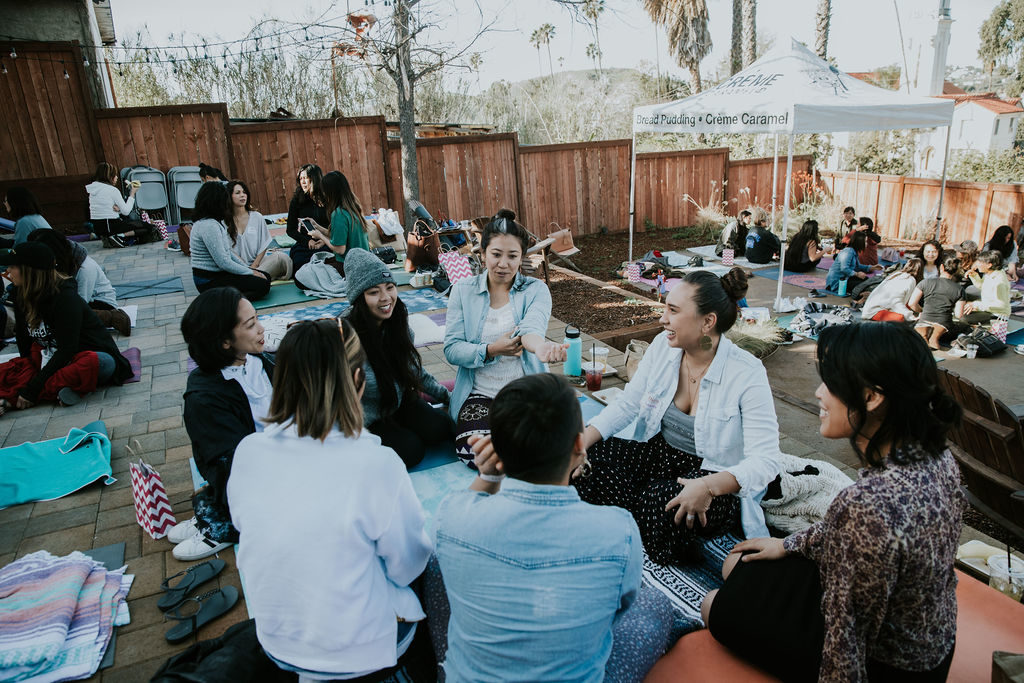
“It was empowering to be around these women. You’re crying and sharing stories but you feel safe,” reflected Ginger Lim-Dimapasok, owner of dessert shop Cafe 86. “You see an owner you admire who’s always strong and doing everything to make her business work, but then all of a sudden, she’s there so vulnerable.”
Lim-Dimapasok was introduced to Entrepinayship in July 2015, when Kristine de la Cruz of Créme Caramel invited her to an after-hours meet-up with seven other Filipina entrepreneurs in the food industry. It was co-hosted by Anna Marie Cruz, who was then the small business coach at Search to Involve Pilipino Americans (SIPA) and had the idea of a group for this specific segment of entrepreneurs in the Filipino-American community.
Building a movement
Numerous reports have noticed the trend of women starting businesses more than ever in the United States — from 2017 to 2018, an American Express report found that there were 1,821 new women-owned businesses started on an average day. It also illustrated that 12.3 million firms were owned by women, generating $1.8 trillion in revenue last year.
When looking at the Asian American population, 51.1 percent of Filipino businesses in the U.S. identify a woman owner. That’s 98,849 out of 193,336 Filipino businesses, according to Census Bureau data between 2007 and 2012.
Despite the rise, barriers still hinder women entrepreneurs, such as the lack of role models and mentors; the gender pay gap; and unequal access to funding. Co-working spaces (The Wing), online communities (Ellevate Network), conferences (Create & Cultivate) and female-founded venture capital funds (Female Founders Fund) are some of the platforms addressing these obstacles.
While Entrepinayship — a portmanteau of the words ‘entrepreneurship’ and ‘Pinay’ — is not a new term nor is a women-only space a novel concept, no group has been directed at Filipina entrepreneurs here in the U.S. to connect with one another and provide access to tools to launch and grow their businesses.
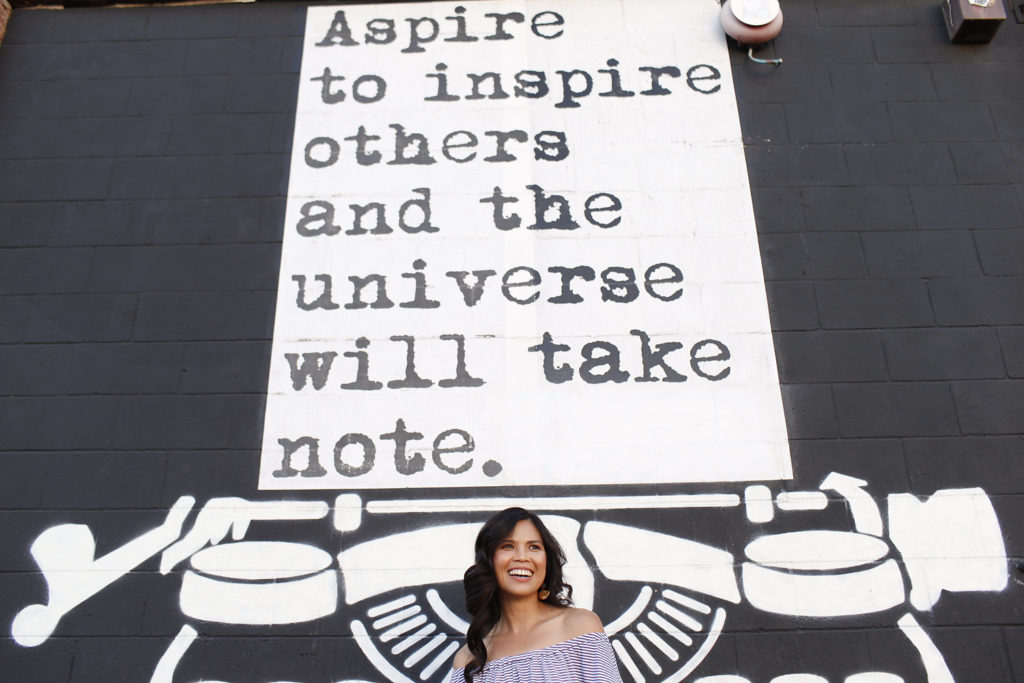
“For Filipinas, we’re the ones who leave the country to pursue work outside of the Philippines. I can’t think of anything more entrepreneurial than that…we’ve been entrepreneurial from day one and these platforms for [women] are long overdue as are these movements like The Wing and Create & Cultivate,” said Cruz, founder and ‘Chief Elevate-Her Officer’ of Entrepinayship. “But what does it mean for women of color too? When we look at these movements, they’re often the mainstream, which is fine, but focusing on what we need specifically as a community allows us to target the resources even better.”
Considerations for this niche would, for example, include understanding credit when immigrant families generally don’t pass down this knowledge and defeating the crab mentality, all of which wouldn’t be acknowledged elsewhere.
Entrepinayship as the budding movement it is today comes from nearly a decade of Cruz’s work with small business owners.
After earning her MBA in 2012, Cruz diverted from the corporate route and was a marketing consultant for the International Labor Organization, which assigned her to a remote village in central Vietnam where she worked with 19 female weavers for six months to create market linkages and products to sell to incoming tourists.
Coming back to Los Angeles, where she grew up after migrating from the Philippines at a young age, Cruz landed at SIPA to oversee its small business programs. “I was supporting micro-entrepreneurship in the LA community. Even though it looked a lot different from that community in Vietnam, it was still about providing the resources and the tools to help them launch and create a sustainable business,” she said. “Part of the reason why I chose to work with the Filipino community was because I’d been working on my own identity.”
51.1 percent of Filipino businesses in the U.S. are founded by women — that’s 98,849 out of 193,336 Filipino businesses.
Though local Fil-Am businesses have existed, Cruz said owners were not receptive when she asked them to speak to the entrepreneurs undergoing SIPA’s training. It was one Sunday when she saw a stand called Créme Caramel at a farmers market that sold leche flan and ube desserts. She reached out to owner Kristine de la Cruz, who was enthusiastic about the idea of sharing her business story and mentoring others. “That was one of the indications that there was more support if I’m finding the right people,” Cruz said.
De la Cruz reflected that while there are chambers of commerce for Filipino Americans, there was nothing “inclusive of people who had the ideals that we Filipino Americans had growing up versus what our parents grew up with.” Second-generation Fil-Ams are more open to collaboration and encouraging other businesses to thrive by buying from them, she said based on her observations.
The two planned the 2015 intimate meet-up to get a pulse of the needs and concerns of some women founders in the food business. Though the gathering was “magical,” Cruz said there was a period of “self-doubt” — where it’s common for entrepreneurs to remain stuck in between idea and execution — that kept Entrepinayship dormant.
“It took a while over the years to solidify the idea because I knew the ‘why’ and ‘what’ from the very beginning…The ‘how’ was still kind of shaping up because while that meet-up was effective, I looked at operational challenges,” she explained. “That was my main focus: How do I make this really sustainable? Are there enough people in the community who would want this and who would continue to give it momentum?”

To experiment with other mediums, Cruz uploaded a series of video interviews with Filipina entrepreneurs in 2016, but then thought it was too narrow so she called it “FoundHer” and expanded to any female entrepreneur, regardless of race and background. “There was one side of me that doubted if it was going to be a success if it was just focused on Filipinas,” she recalled. “There was another part of me that said that I can’t do it unless it’s just Filipinas. It didn’t feel 100 percent aligned with my passion.”
After SIPA, Cruz went on to her current role as a business development officer for CDC Small Business Finance, which offers low-interest financing for small businesses.
Reignited purpose
Cruz was a panelist at a Filipina entrepreneurship event in Long Beach last summer, which “was validation that I needed to speak directly to Filipinas,” she said. So she became more vocal about Entrepinayship again and started sharing stories on Instagram about Entrepinays and ‘Intrapinays,’ Filipinas who are taking the lead at other organizations and are entrepreneurial by nature.
Social media has led Entrepinayship to discover Filipina-owned ventures in far flung areas, from London-based Lunes shop, which creates Filipino-themed greeting cards, to Theo & Brom in Belgium, a chocolate company by Filipina Myey Moyens that makes the world’s first Belgian tableya.
“It doesn’t matter if you’re in LA. Even if we’re born in LA, we are being raised by so many cities and communities around the world,” Cruz said. “I’m finding women everywhere, literally in all parts of the world. The incredible amount of talent we have in every industry…I can’t think of one industry where we don’t shine, whether it’s tech, beauty, the arts. It’s overwhelming. Sometimes I want to cry and ask, ‘Why hasn’t this been done before?’”
In the Bay Area, LEAD Filipino’s 2017 Fly Pinays summit borrowed the ‘Entrepinayship’ term from Cruz for a panel of Filipina entrepreneurs. Gina Rosales, an event planner in San Francisco who co-produces the UNDISCOVERED SF in the SOMA Pilipinas district, was on the panel and was inspired to start the similarly named ‘Entrepinays’ group. It held a summit last year with 130 attendees and plans to do so annually.
“The focus of Entrepinays is to support and encourage Pinay business owners, yes, but the real heart of our summit is to promote the idea of Pinayism,” Rosales said, referencing the work of professor and community leader Allyson Tintiangco-Cubales. “It is rooted in the concept of sisterhood, and how as Pinays we’re actually taught to fear/hate each other and compete against each other, but really what we need is to join together and support each other.”
Though two separate groups, the emergence of Pinay entrepreneurs across California is promising.
Fast forward to this past fall, Cruz ran into Philippine Vice Consul Dyan Pastrana at a Women’s Entrepreneurship Day event hosted by the LA Mayor’s Office, with the latter encouraging Cruz to re-launch Entrepinayship. It took about three weeks for them to plan a day-long Women’s Entrepreneurship Forum under the Philippine Consulate General on December 11, 2018, which featured speakers from business institutions and two panels on women changemakers and how to start a business.
Pastrana said that initiatives on women’s empowerment, leadership and entrepreneurship like Entrepinayship align with her work as the gender and development lead at the Philippine Consulate in LA. “Women’s empowerment and gender equality [are what] we truly strive for, as we still see a lot of issues affecting women and children in our diplomacy work,” said Pastrana, who handles cases of Filipina women trafficked and abused in the Consulate territory. “Through Entrepinayship, we can build on programs on financial literacy, reintegration and women’s entrepreneurship for our community of women here and we hope this is replicated in other areas as well.”
Invigorated by the momentum from the December conference, Entrepinayship went into 2019 with the opportunity to set the tone and position itself where a hole had existed for so long.
It was clearer now that Entrepinayship, as intended, would concentrate on: inspiration, connection, and resources.
“For me, wellness in our community is not just taking the day off and pampering yourself. It’s changing the mindset about how you’re going to continually take care of yourself before you can be there for your business, your community, and your family,” said Cruz.
The group’s founder, who is also a health and business coach for high-performing women, envisioned the January retreat to be a small barbecue at a park, but scrapped that to intentionally have programming and an experience that would provide value for participants. In addition to the business and personal development side, it was essential to include a wellness component and how to incorporate mechanisms that would fit into the lifestyle of the Entrepinay.
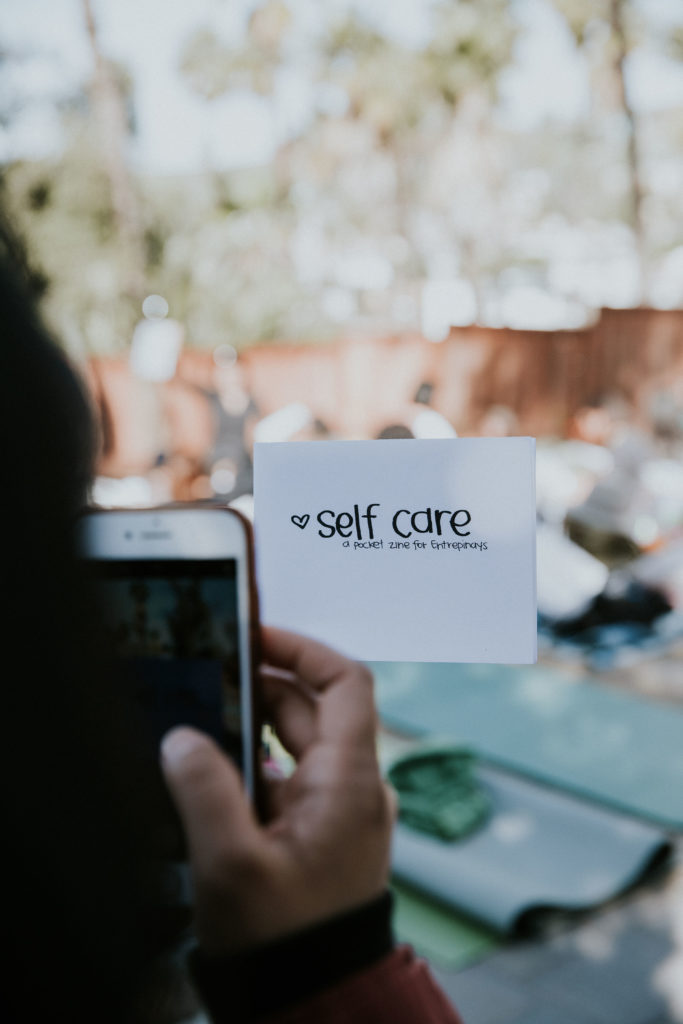
“I’m sure there are other cultures like this but the idea of martyrdom is so big in our community that we run ourselves ragged to our own detriment just to serve others. It is embedded in us,” Cruz said. “For me, wellness in our community is not just taking the day off and pampering yourself. It’s changing the mindset about how you’re going to continually take care of yourself before you can be there for your business, your community, and your family.”
Selecting speakers and facilitators for the retreat came easily because Cruz tapped into her growing network of Entrepinays and saw who would be a good fit for each topic.
“Finding people who aligned with the vision, the why and the purpose is so important. That’s really what’s allowed this to have a life of its own. It’s not me and the idea,” Cruz said. “It’s people understanding that this is for something bigger…Just like any entrepreneur says, you have to identify a gap and you have to figure out what that need is and what you’re going to create to serve that need.”
The retreat was publicized on social media and sold out a few days before. Participants who drove to the ‘secret’ location in LA came from throughout Southern California, like the Inland Empire and Orange County, or flew in from the Bay Area.
“For a long time, I felt that there wasn’t a group of women that understood exactly the challenges that I went through,” shared marketing advisor and serial entrepreneur Roslynn Alba Cobarrubias.
The posts were meant to highlight that this event would not put speakers on pedestals, tout their accolades and accomplishments, and breed that insecurity.
“At the end of the day, why would you go to an event only to hear about how great someone is? You’ve got to feel it’s for you. You’ve got to know you’re getting your money’s worth and that investment is a self-investment. That was the message about everything I put out there. This is for you, a special day for you, and only you,” Cruz said.
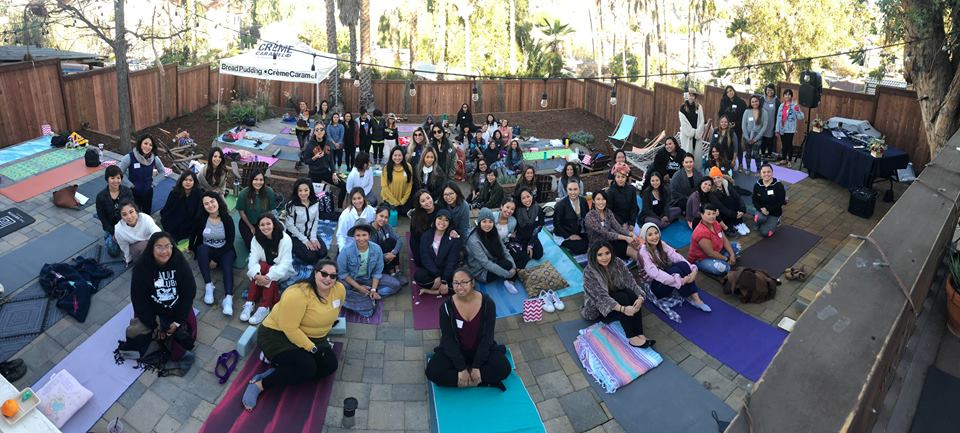
Marketing advisor Roslynn Alba Cobarrubias, who co-founded and sold global talent discovery platform mydiveo for $7.4 million, said a platform like Entrepinayship has made her feel less alone and is a safe space to ask questions — which she still has a lot of despite being a serial entrepreneur — without being judged.
“For a long time, I felt that there wasn’t a group of women that understood exactly the challenges that I went through. A lot of the times in other rooms, [I would be] afraid of being judged so we have to pretend to know everything in fear of not being taken seriously,” Cobarrubias said, adding “I didn’t have this support throughout my career nor in recent years so it was great to be surrounded by Pinays who are welcoming, sensitive and helpful [because] we care in a different kind of way.”
While a majority of retreat participants have established brands and services, there were many who have side hustles or leadership positions within their workplaces. Entrepinayship, despite the entrepreneurial slant, has a place for them too and is not to “shame” those who are still testing the waters because “we still have day-to-day expenses,” Cruz said.
Professional development sessions and memberships can tend to be expensive, but Entrepinayship seeks to be accessible no matter what stage a Pinay is in her career or business journey. (The January retreat was priced at $45 per person, while similar mainstream events can bear a price tag in the hundreds, for instance.)
“Access and transparency are important for me and Entrepinayship. Transparency, especially when it comes to business ethics, is a topic that as a community we can start talking about. Another thing is fairness. I never want to put someone in the spotlight at the expense of somebody else,” Cruz said. “If you go to an Entrepinayship retreat, you know you go there as an equal. Even if someone has more expertise in a particular area, you are going to feel that you are as valuable as the next person…The idea of democratizing access and also the resources and the way we see ourselves is huge.”
Sustaining the spark
“If there’s one thing about experience, the value isn’t from what retains in your own head. The value is how it helps other people avoid those same mistakes,” said Kristine de la Cruz, owner of Créme Caramel and Entrepinayship advisor.
The feedback after the retreat has been constructive, like programs targeting specific concerns or allowing more time to talk with other Entrepinays.
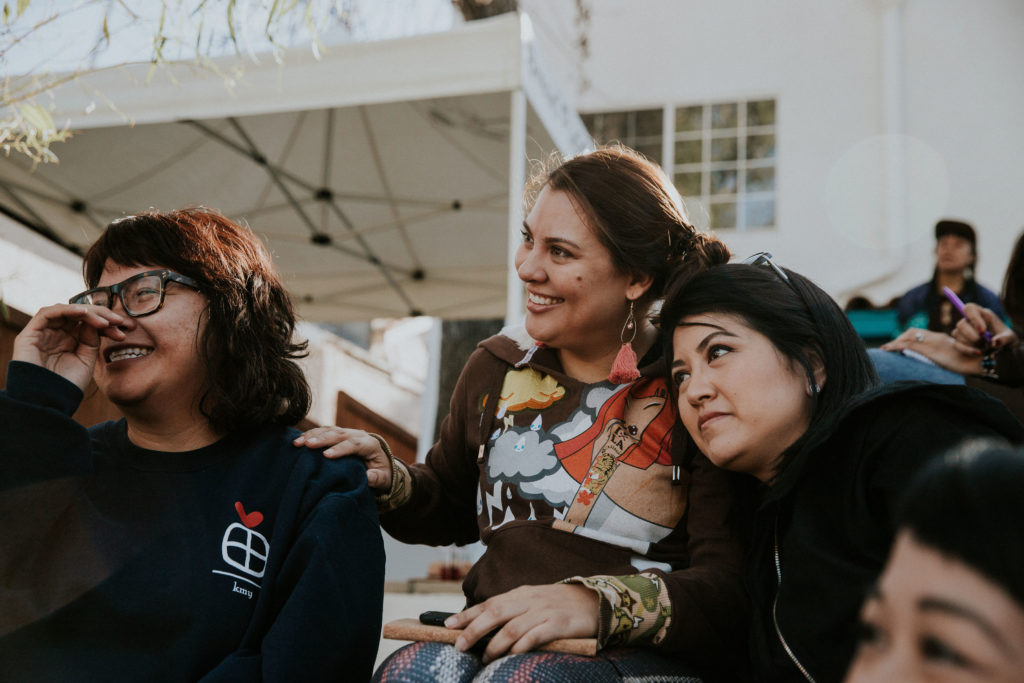
De la Cruz, who co-hosted the retreat and is an advisor to Entrepinayship, said that professional networking environments can be daunting but she hopes that future events are welcoming to those who are not as extroverted or may be shy to pose questions to the more seasoned entrepreneurs.
“I like sharing and helping someone learn from the mistakes I made. If there’s one thing about experience, the value isn’t from what retains in your own head. The value is how it helps other people avoid those same mistakes,” she said.
That’s why the organization will have Kumare Circles throughout the year, which can range from wine nights or skill-based workshops for a smaller set of women.
Sara Meredith, founder of coconut oil-based skincare line Kaya Essentials, hosted a circle in February that had a yoga practice and conversation between women who represent a range of fields from law to fashion. “Our Galentine’s Kumare Circle brought 24 women together. We had a gentle heart opener sequence followed by a self-love workshop,” Meredith said. “We got to hear from each and every one of us and focused on the positive and what superpower we brought into our personal and professional lives.”
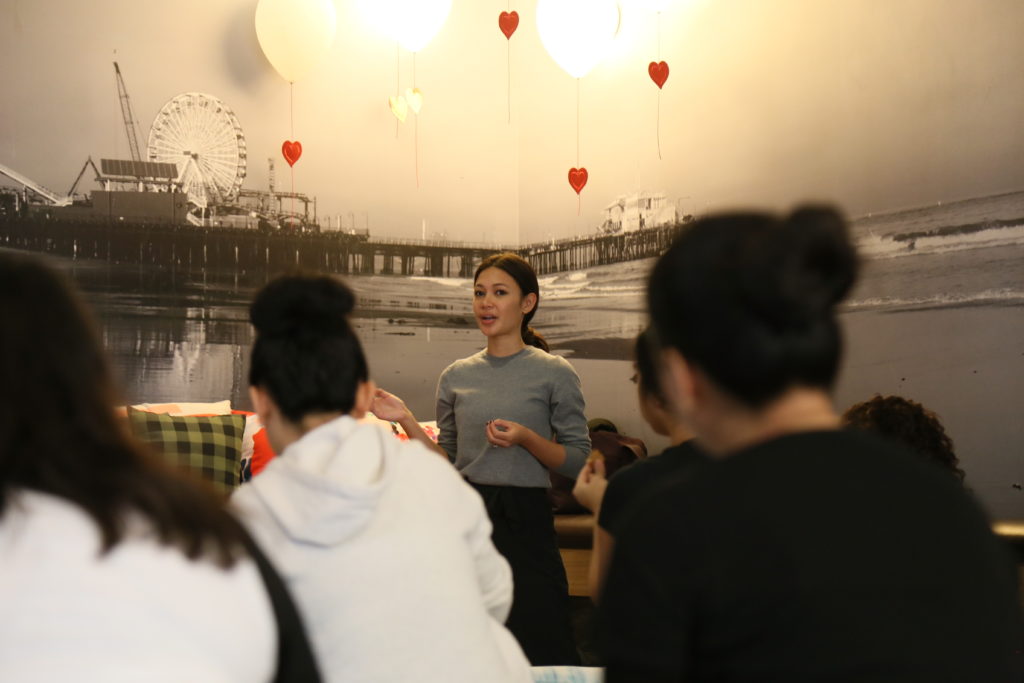
These circles are meant to be organized by members themselves and to be an exchange of ideas and support group on a face-to-face level. They’re not meant to be transactional and peddling products to a group of women, but rather creating a relationship and support system organically.
One recent collaboration was when Lim-Dimapasok met Carissa Ortega of Ninong’s Pastries & Cafe at the retreat. It led to selling the latter’s ube cookie butter jars at all Cafe 86 locations for one day in February. “[Ortega] and I discovered how much we had in common…and it only made sense to help my new sister out by broadening her reach out to the Inland Empire and Las Vegas where my stores are situated,” Lim-Dimapasok said.
Beyond the attendance at the live events and the number of shares online, examples of deeper connections like this measure the impact and facilitation of Entrepinayship.
In the first quarter of 2019, Entrepinayship has been active with its programming and visibility. The FoundHer interviews from 2016 have been repurposed and relaunched as a bi-monthly podcast available on Spotify, iTunes, and the organization’s website. The group held a panel with five Entrepinays at the Southern California Pilipino American Student Alliance (SCPASA) summit this past February and had a workshop with Cobarrubias focused on “marketing Filipinos to a global stage.”
“It’s our time. We won Miss Universe, a Golden Globe as a Filipino character, [and] a Grammy after being raised in a karaoke household singing Sharon Cuneta. The stars are aligning for us to reach the global stage. We can’t hide behind the scenes anymore,” Cobarrubias said. “We need to work together to push our Filipino movement further in music, film, TV, arts, science, and more. We need to own our history, our work and be proud of it. Most importantly, we need to stop bringing one another down with the crab…mentality but instead stand proudly next to each other and offering guidance, support and opportunities in the exact way Entrepinayship is.”
This March, the first online Entrepinayship Academy program led by Elisa Estrera of Gratefruit Consulting was unveiled. The four-week online course every Tuesday night is targeted for Entrepinays who want to experiment with their business ideas.
“Through Hatch, we hope to debunk the misconceptions of how scary and difficult it is to test a product or service in the real world, and especially that it doesn’t have to be perfect. The program is only a month long to show that progress can be made in that little time,” Estrera, a business consultant with a background in tech product management, said.
Participants will have that accountability and peer support to stay on track. “After four weeks, they will have done a proof of concept, walk away with a solid business plan, financial plan, [and] action plan for the next three months to keep momentum, and an understanding of when to keep improving or when to pivot. Most importantly, they’ll learn how to introduce more play and experimentation in bringing their ideas to life,” she added.
“At its core, women’s entrepreneurship is women’s empowerment…” said Cruz. “It’s a movement that anyone can gravitate to because it’s our own independence and supporting each other to reach their own independence.”
As its purpose is to build a sustainable and thriving business network for Pinays, Entrepinayship is a business in itself and puts Cruz in the position of considering how it can be a viable, legacy organization for the community. Partnerships with corporations and organizations are being eyed.
Other offerings and services will be rolled out within the year, as well as a second retreat at a surprise location, Cruz teased.
“At its core, women’s entrepreneurship is women’s empowerment. For me personally, I’ve always been interested in women’s empowerment but that had changed for me over time…In some ways, it focused on victimization, whereas women’s entrepreneurship is this revolution of women’s empowerment because it really is about independence. I get so excited about it because it’s like the parable about teaching someone to fish versus giving them the fish,” Cruz said. “Entrepinayship takes on that principle that we’re not here to solve every problem and we’re not here to give you a blanket to keep you warm for one night, but we want you to be able to build the home that you need so that you have shelter forever. It’s a movement that anyone can gravitate to because it’s our own independence and supporting each other to reach their own independence. Maybe that’s why people are interested in it.”


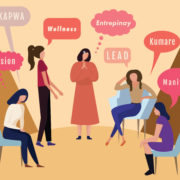
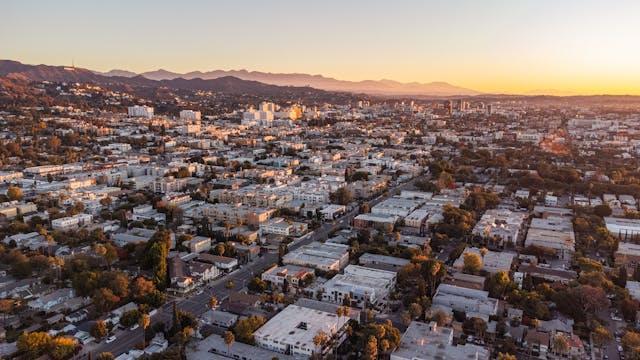
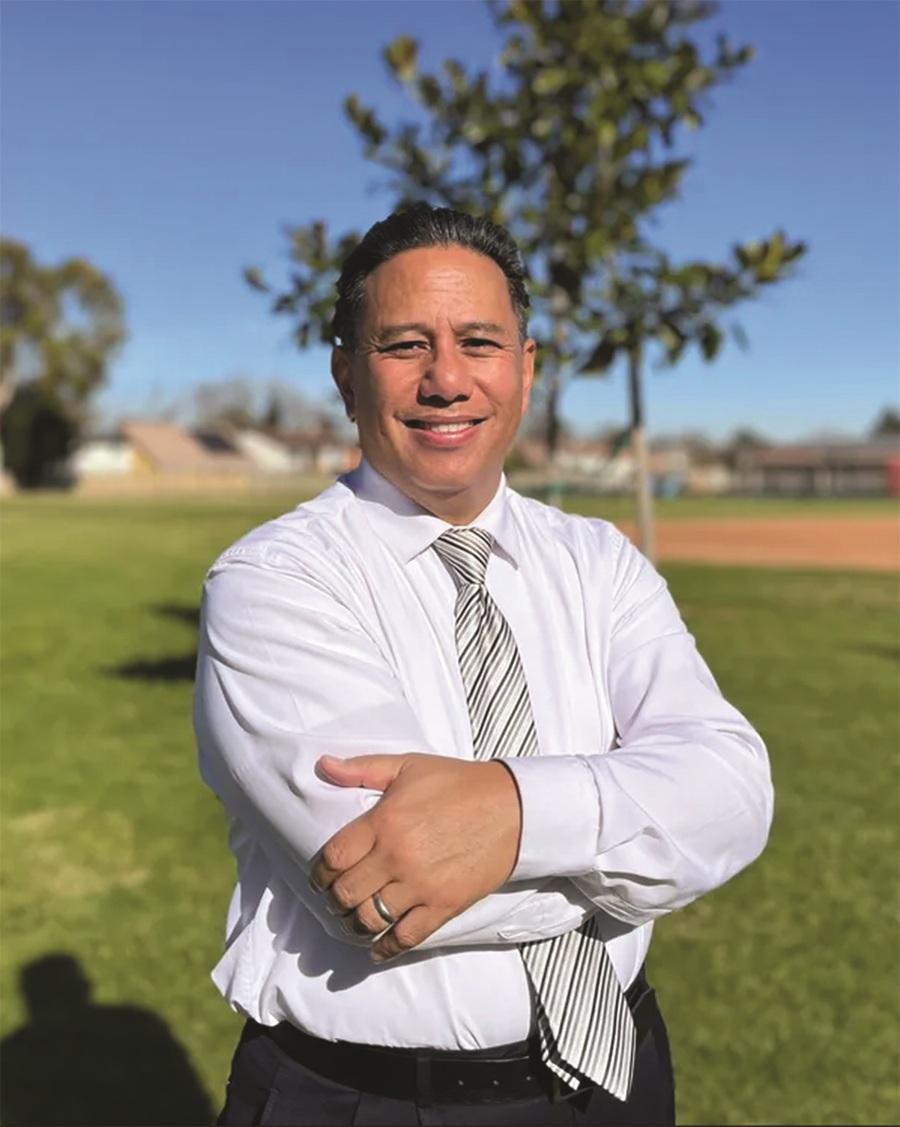
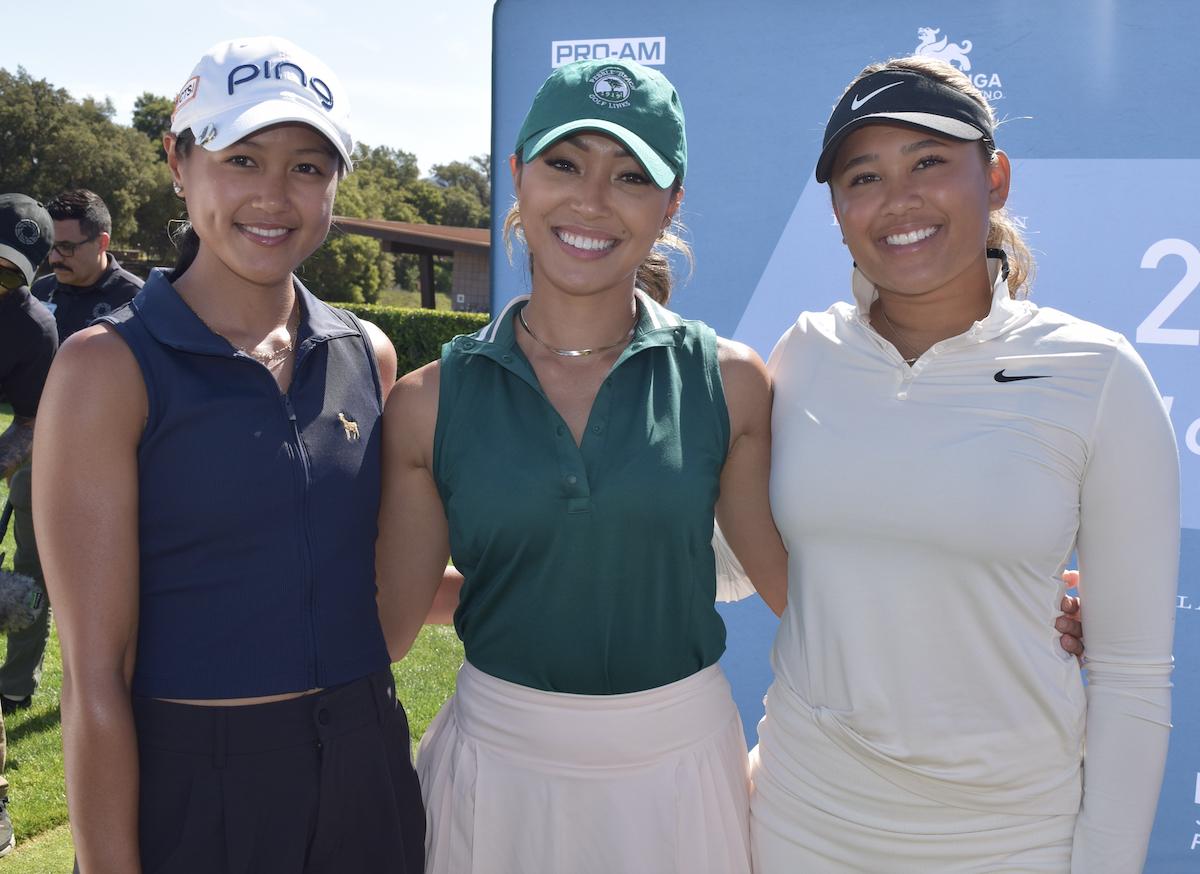

Love this article Anna! Congrats on being recognized for all the wonderful work, passion, and drive that you put into our local and global Filipino community! This is only the beginning. -Rechie
Congratulations @Anna Marie. Am so proud of your accomplishments. I always love reading your articles. It does inspires me.
@Christina Oriel, thank you for posting. Excellent work.????????
Wonderful article.. I commend these ladies for their enterprenual and Kumare spirit. And to find my niece Roslynn a part of this endeavor is not surprisng. Keep it up